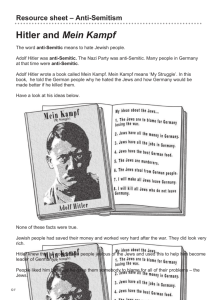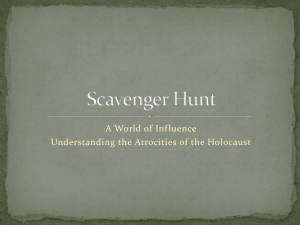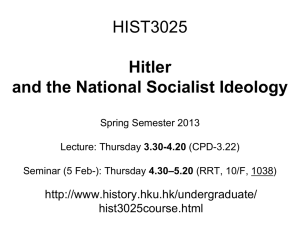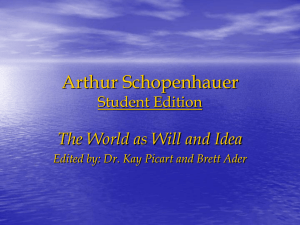Baglione, intell. revol.doc
advertisement
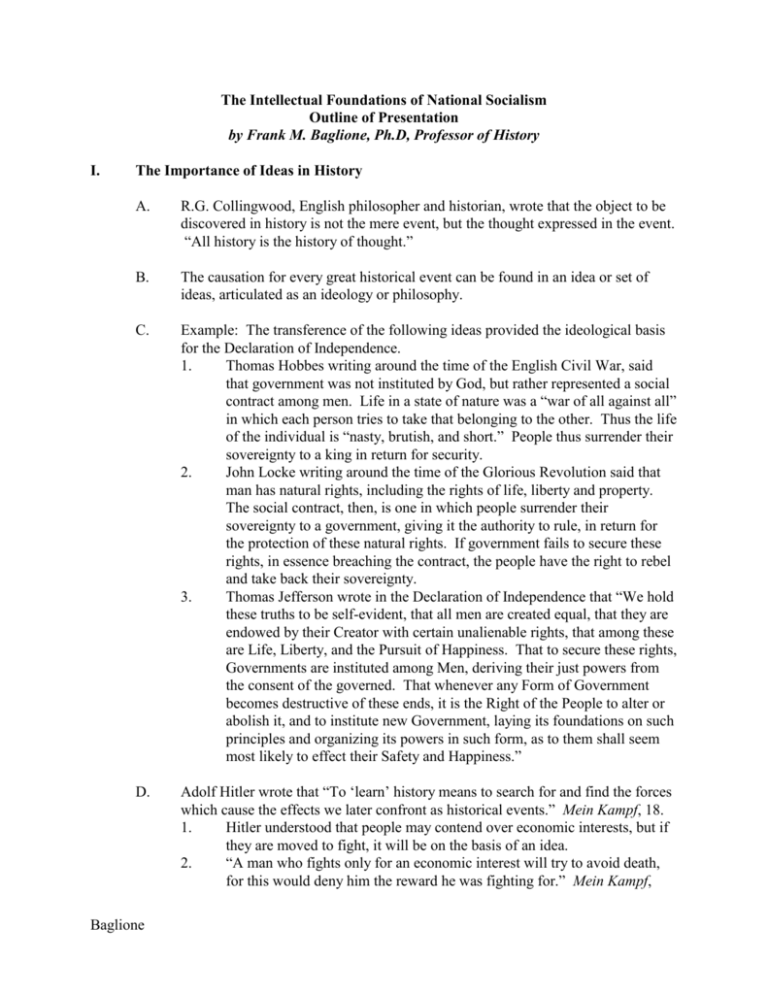
The Intellectual Foundations of National Socialism Outline of Presentation by Frank M. Baglione, Ph.D, Professor of History I. The Importance of Ideas in History A. R.G. Collingwood, English philosopher and historian, wrote that the object to be discovered in history is not the mere event, but the thought expressed in the event. “All history is the history of thought.” B. The causation for every great historical event can be found in an idea or set of ideas, articulated as an ideology or philosophy. C. Example: The transference of the following ideas provided the ideological basis for the Declaration of Independence. 1. Thomas Hobbes writing around the time of the English Civil War, said that government was not instituted by God, but rather represented a social contract among men. Life in a state of nature was a “war of all against all” in which each person tries to take that belonging to the other. Thus the life of the individual is “nasty, brutish, and short.” People thus surrender their sovereignty to a king in return for security. 2. John Locke writing around the time of the Glorious Revolution said that man has natural rights, including the rights of life, liberty and property. The social contract, then, is one in which people surrender their sovereignty to a government, giving it the authority to rule, in return for the protection of these natural rights. If government fails to secure these rights, in essence breaching the contract, the people have the right to rebel and take back their sovereignty. 3. Thomas Jefferson wrote in the Declaration of Independence that “We hold these truths to be self-evident, that all men are created equal, that they are endowed by their Creator with certain unalienable rights, that among these are Life, Liberty, and the Pursuit of Happiness. That to secure these rights, Governments are instituted among Men, deriving their just powers from the consent of the governed. That whenever any Form of Government becomes destructive of these ends, it is the Right of the People to alter or abolish it, and to institute new Government, laying its foundations on such principles and organizing its powers in such form, as to them shall seem most likely to effect their Safety and Happiness.” D. Adolf Hitler wrote that “To ‘learn’ history means to search for and find the forces which cause the effects we later confront as historical events.” Mein Kampf, 18. 1. Hitler understood that people may contend over economic interests, but if they are moved to fight, it will be on the basis of an idea. 2. “A man who fights only for an economic interest will try to avoid death, for this would deny him the reward he was fighting for.” Mein Kampf, Baglione 3. 4. 5. II. 200. “One does not sacrifice his life for business, but for ideals.” Ibid. “Every power which does not grow out of a firm intellectual base will remain wavering and insecure.” Secret Conversations, 68. Hitler believed that the conflict in European civilization stemmed from its being caught between the conflicting ideas of the French and Russian revolutions. If National Socialism was to rescue European civilization from this conflict, it would have to be on the strength of a new idea (“a new philosophy of fundamental significance”). Mein Kampf, 373. The Intellectual Background to National Socialism (The Usual Suspects) A. Historians have sought the source of Hitler’s ideas in a number of intellectual movements and their peculiar development in Germany. B. Romanticism. An intellectual movement that dominated European culture from about 1780 to 1830. Its chief characteristic was an emphasis on emotion and imagination as the chief means by which we apprehend the reality of human experience and achieve artistic creativity. 1. The term Romanticism was coined by Madame de Stael, daughter of Jacques Necker and thorn in the side of Napoleon, in her book on Germany (1813). She criticized the artificiality of the 18th century’s classical literature and praised the naturalness of Germany’s Sturm und Drang poets writing in the 1770s. The Sturm und Drang rejected the rules of classical style and stressed rebellion against convention, an enthusiasm for nature, and the discomfort of man in contemporary society. 2. Johan Wolfgang von Goethe (1749-1832), retelling the story of Faust described the crisis of a man who has found his years of study has not produced knowledge. Although the Faust story is often seen as an allegory of man’s striving for knowledge and power, for Goethe it was the expression of every man’s natural striving for life and for new experiences. 3. Since every man is part of nature, he shares the basic impulse of all beings to develop, to strive for an ideal. Yet the reality of nature is, as it was for Faust, that there is no fulfillment in all this activity – contentment meant annihilation. Man is destined to be dissatisfied no matter what he achieves. 4. Romanticism was both a reaction against the old, in the form of 18th century rationalism, materialism, and mechanism, and against the new, in the form of industrialism, capitalism, and urbanism. 5. In Germany, Romanticism fled the cosmopolitanism of the Enlightenment and melded with nationalism. The Romantics’ fascination with the uniqueness and richness of cultural expressions – a people’s language, songs, and legends – came to emphasize differences among peoples. 6. Feelings were especially sharp in the Germanies because of the occupation Baglione of the French under Napoleon. Johnann Herder (1744-1803), resenting the dominance of French culture, exalted the folk culture of the Germans. C. German Idealism. Intellectual movement in the first half of the 19th century. Though associated with philosophical idealism (the Idea behind imperfect forms) it contained a mystical element blending the ideal with the spiritual. Its leading figure in Germany was Georg Wilhelm Friedrich Hegel (1770-1831). 1. Only Mind (Geist) is real. Geist is a complicated word in German. It means mind, intellect, imagination, soul, essence, spirit. (Zeitgeist, the spirit of the age.) Expression of a philosophical idealism, akin to Plato’s, in that material things exist but only the mind reflects reality. 2. A fundamental feature of the mind is its freedom. Because nothing that is finite or partial can be free, the mind is infinite. The mind’s knowledge of the material world is a self-knowledge. 3. Hegel, like Hobbes, saw a plurality of living and desiring beings each seeking to subdue the world to his own desires, make it part of himself and gain the acknowledgment of others for this conquest. Thus there is in life a struggle for power and recognition. 4. Hegel, like Rousseau, believed that an individual might be free even when being coerced. He might not like the coercion, but his rational mind approves of it. Men enjoy freedom when the order of civilized life is maintained in and by the state. D. Nationalism. Idea that the political entity of the state is the expression of a people who share a common ethnic origin, language, culture, and history. Eventually became a principle of Western civilization that a people with such common characteristics have a right to political self-expression in a state. 1. Concept of the nation-state grew up during the Renaissance, expressed in the literary transition to vernacular languages and ethnic identities. Politically, it began to distinguish itself from the monarchical idea, which it came to oppose, an antagonism between concepts of subject and citizen. 2. First appearance in Western Europe (England, France, Spain, and Portugal). The Germanies like the Italies longed for such national unity, which eluded them until the late 19th century. In Eastern Europe, empires (Austrian, Russian, Ottoman) made up of many ethnic groups resisted nationalism until the early 20th century. 3. Like other peoples frustrated in the attempt at national unification, German nationalists dwelt on the uniqueness of their people, language, and culture. Came to see these characteristics as superior expressions. 4. Herder wrote of the volkgeist, the unique spirit of a people expressed in their culture. This cultural unity had to substitute for political unity. E. Volkisch ideas. The term Volk in German can be translated as people, nation, tribe, race, men. Its meaning is more difficult to pin down, however, for it contains a mystical dimension. Baglione 1. 2. 3. George Mosse noted that since the period of German Romanticism the term signified a kind of transcendental “essence” or “innermost nature” of a people. Crisis of German Ideology, 4. Similarities with Romanticism in that it stemmed in part from a longing to be part of the living forces of nature and it expressed feelings of alienation from and rejection of modernism (industrialization and urbanization). Organic, fused with the native landscape, hierarchical, rooted. AntiSemitic – Jews as outside the Volk, rootless cosmopolitans. F. Pan-Germanism. Another 19th century movement, like the Volkisch movement, that grew out of a Romantic nationalism. 1. Like the Volkisch movement, it arose from the shock of the Napoleonic invasions and the frustration of German particularism, the inability of the German states to form a nation. But Pan-Germanism was less mystical. 2. Pan-Germanism sought the unification of all Germans speaking peoples in Central and Eastern Europe in unified state. 3. Nationalistic and Imperialistic, sought additional lands for Germans. 4. Saw Jews as chief threat to German nationalism. G. Conservatism. Tradition, authority, community are basis for orderly society. 1. Effort to restore the values of Western culture prior to the Renaissance and Enlightenment. Reaction against liberal Enlightenment’s emphasis on reason, liberty, and individualism. 2. Edmund Burke argued that societies grow organically, slowly. Abstract ideas divorced from historical experience bred fanaticism and tyranny. 3. Shared with Romanticism an emphasis on nature and admiration for the society of medieval Christianity, an orderly, hierarchical, fixed society. 4. Social institutions are organic, grow up over centuries from the experiences of a people. Cannot cut out institutions like the monarchy, the church, aristocracy without wounding society. 5. Social institutions keep in check the wickedness and arrogance of man, and having developed organically over time in response to social conditions, they are superior to artificial creations, like written constitutions. 6. There is in conservatism a conjunction of Romanticism and Nationalism. H. Social Darwinism. In the late 19th century, ideas of conservative Romanticism and Nationalism found a powerful expression in Social Darwinism. 1. Darwin’s natural selection as the vehicle of evolution stressed that individuals with certain characteristics that allow them a competitive edge in a particular environment will survive and consequently mate more frequently until these characteristics are generalized in the population. 2. Darwin learned from Malthus that life is a struggle for limited resources. 3. Social Darwinists (Herbert Spencer in England, William Graham Sumner in America) applied these ideas to human society. Those possessing the Baglione 4. I. III. characteristics that aid in the struggle for existence are termed as superior, those who lack them as inferior. The successful in the human social environment need not feel bad about their wealth and power; it’s just natural. The weak should not be helped, for helping them to survive will allow them to mate and pass on the inferior characteristics to their progeny. Imperialism. The extension of sovereignty or control – direct or indirect, political or economic – by one government, nation, or group over another. 1. “Imperialism is an idea, whether its supporters and executors are aware of the fact or not.” Oswald Spengler in 1933. Imperialist idea in Western civilization was a Faustian striving towards infinity shaping the policy of powers preparing to wage “the final war for supremacy on this planet.” 2. Faustian nations, Spengler said, are elective affinities of men with a common feeling about life, with the same imperatives of a strong will and with the same language – men of race and strong instincts who feel themselves born and called to be masters. As Spengler used the term, the Faustian striving for infinity represented the tragic desire to attain what even the reacher knows is unattainable. 3. Joseph Schumpeter, Austrian economist, in Sociology of Imperialisms. Aggressiveness pursued for its own sake; tendency towards unlimited expansion. Instinct of early Western warrior societies for which expansion was necessary to survival. The psychological and social structures acquired maintained themselves long after they had lost their lifepreserving function. Imperialism was atavistic in modern capitalist world, but instincts for self-preservation and power are broader and stronger motivational forces for human behavior than rational, economic ends. Influences on Hitler’s Thought. A. To some extent, all of the above has served as the answer because they identify the general ideas and philosophies influencing European political thought in general and German thought in particular. 1. Jefferson said he drew his ideas “from the harmonizing sentiments of the day.” The intellectual schools and ideologies noted above were the harmonizing sentiments of Hitler’s period. B. Baglione There has been a rather determined effort to not understand the intellectual origins of National Socialism. The fear is that if once such ideas were admitted to be comprehensible, they would have to be acknowledged as legitimate thought. Historians have allowed their scholarship to be overshadowed by pronouncements of anathema, such as that of Golo Mann, that Hitler was “a remarkably evil and repellent being – a monster,” which tend to prejudice a reader’s conclusions. 1. The Revolution of Nihilism (1939) Hermann Rauschning, a disillusioned Nazi party member living in exile in the United States wrote that Hitler’s theoretical pretensions in Mein Kampf were nonsense, and poorly written nonsense at that: “Nobody took it seriously, or could even understand that style.” National Socialism not a coherent philosophy or policy, but action pure and simple. “One thing it was not,” declared Rauschning, “doctrine or philosophy.” Revolution of Nihilism, ix, 23, 29. 2. 3. 4. 5. 6. 7. Baglione Peter Viereck, in Metapolitics: From the Romantics to Hitler (1941) German Romanticism and Wagnerism were the sources of National Socialist ideas, but only through a “vulgar misrepresentation of these ideas by terrible simplificateurs and a cynical misuse by demagogues needing a window dressing.” xxvi, xxxiv, 315. Alan Bullock, Hitler: A Study in Tyranny (1952), wrote that Hitler was consumed with a lust for power, “the will to power in its crudest and purest form, not identifying itself with the triumph of a principle as with Lenin or Robespierre – for the only principle of Nazism was power and domination for its own sake. 383. Fritz Stern’s The Politics of Cultural Despair (1961), described a general current of thought in Germany which created a conservative revolution attacking the philosophical premises of liberalism and fostering volkisch racial myths designed to rescue and regenerate society. The subjects of his study dealt in ideas related to both European philosophy and National Socialism, but as they distorted the ideas of the romantics and critics of liberal democracy, so too did the National Socialists in turn appropriate and vulgarize their ideas. Nazis were “uneducated rabble rousers,” men who held thought itself in contempt and regarded ideas as mere weapons in the political struggle for power. xvi-xvii, 294-295. George Mosse’s The Crisis of German Ideology (1964). Anti-liberalism and anti-Semitism, part of a general European attitude, penetrated more deeply into the national fabric of Germany to form the basis for National Socialism. Hitler’s achievement was translating these ideas, to which the mass of Germans were receptive to, into a mass movement. Hitler’s genius was not an intellectual power, but the ability to wed volkisch ideology to a disciplined, efficient political organization. 298. In The German Dictatorship (1969), Karl Bracher termed Mein Kampf, “a tedious compilation of turgid discourses on repetitious themes” whose substance was borrowed from Schopenhauer, Chamberlain, Spengler, Lagrade, and Wagner “which the author...distorted and vulgarized.” Hitler’s ideas were half-baked, the thought of “an adolescent charlatan and rootless wastrel” cast into a pretentious Weltanschauung and endowed with political effectiveness by the virtuosity of a born demagogue. 128129. Joachim Fest, in Hitler (1973), wrote that Hitler seized upon the most disparate elements of ideas – those of Schopenhauer, Nietzsche, Wagner, Gobineau, and Karl Lueger. “The system was arbitrary, queer, full of half- 8. 9. 10. IV. educated rashness, but it had a certain coherence.” Hitler’s Mein Kampf, was unread by the Germans who referred to it, according to a joke of the 1930's, as “The World as Will Without Idea,” an allusion to the title of Schopenhauer’s master work. 132, 213-215. Eberhard Jackel’s work, Hitler’s Weltanschauung (1969) gently criticized the historical debate on Hitler’s intellect and the intellectual content of National Socialism: “...anyone who starts out operating with the vocabulary of passionate negation and moral outrage, be it that he cannot or does not want to do it differently, anyone who continually employs derogatory quotation marks, anyone who thinks he has to distance himself from his subject in every line, anyone like that cannot really expect to understand anything.... Of course, if Goethe’s statement is true that one cannot learn to understand anything one does not love, then all serious research concerning Hitler has to be given up.... 21-22. In 1972 Hugh Trevor-Roper wrote, “I wish to maintain – contrary as it appears, to all received opinion – that Hitler had a mind.... He was a systematic thinker, and his mind is, to the historian, as important a problem as the mind of Bismarck or Lenin.” Trevor-Roper did not break the consensus that this mind was “course, turgid, narrow, rigid, cruel, with nothing to recommend it save its power,” but he said that he saw in it, among other things, the influence of Schopenhauer’s doctrine of Will. (“The Mind of Adolf Hitler,” preface to Hitler’s Secret Conversations.) J.P. Stern, in Hitler: The Fuhrer and the People (1975), wrote that to speak, as Bullock had, of Hitler’s moral and intellectual cretinism was no longer justified. Stern felt that Hitler had a clear grasp of the philosophy of Will, and that this concept had meant the same thing to Schopenhauer and Hitler – the agent of a law of nature, an all-encompassing metaphysical principle. Stern said that the concept of Will was one of the constitutive elements of fascism, which he defined as the politicized ideology of Will. Home at Last. Schopenhauer and Nietzsche A. Baglione Schopenhauer’s Influence. 1. August Kubizek, Hitler’s closest friend, wrote that when not attending performances of Wagner’s operas, Hitler spent most of his time with his reading. “As for philosophical works, he always had his Schopenhauer by him, later Nietzsche, too.” The Young Hitler I Knew, 183. 2. In 1913 Hitler’s landlord Josef Popp said that he often found Hitler reading the works of Schopenhauer and Plato. Werner Maser, Hitler, 124. 3. Hitler acknowledged Schopenhauer had the greatest influence on him, and he referred to Schopenhauer more often than any other thinker. 4. “It is on the foundations of Kant’s theory of knowledge that Schopenhauer built the edifice of his philosophy, and it is Schopenhauer who annihilated B. Baglione the pragmatism of Hegel. I carried Schopenhauer’s works with me throughout the whole of the First World War. From him I learned a great deal. Hitler, Secret Conversations, 584. Hitler and Schopenhauer’s Will-to-Live. 1. In his two volume work, The World as Will and Representation (1818), Schopenhauer wrote that the world of objects as they appear to perception, the world of experience, is mere phenomenon – as Representation. The inner nature of reality, the essence or inner nature of everything, what Kant called “the thing-in-itself,” Schopenhauer called Will. Die Welt als Wille und Verstellung (hereinafter Welt), I, 125, II, 221). 2. Will is the expression of a primordial, blind force; indivisible and yet found in everything, the unconscious forces of nature and the deliberate actions of man. It exhibits one major characteristic – a relentless striving without aim to which no attained goal could put an end. Welt, I, 131-137, 199. a. Hitler: The instinct for life and the struggle for life manifest themselves as instincts embedded in the subconscious of every member of a species. Mein Kampf, 444-445. 3. Cast adrift in a universe without purpose or goal, man as Will exists in a kind of Hobbsean state of nature, driven by this unchecked striving, seeking only his own survival, beset by a thousand accidents and enemies. “Thus went man in a savage state and thus man goes in civilized life; there is no real security for him.” Welt, I, 368. a. Hitler: Life is a continual struggle in which there is no point where man can feel his existence is secure. Mein Kampf, I, 245. 4. All human activity is directed toward the single goal of maintaining existence. No other goal was real, no other could explain human motivation. The Will is a will-to-live. Welt, II, 399-400). a. Primary reason and ultimate effect for all thought and invention is to serve man in his struggle for existence. Mein Kampf, 445. 5. Each individual seeks his existence at the expense of others. Result is pursuit, anxiety, and suffering. Human race not only subdues all other beings, but fights among its members for supremacy, Homo homini lupus (man is the wolf for man). But as soon as he acquires his desire, it no longer looks the same and a new desire arises, a constant transition from desire to satisfaction to desire. Welt, I, 174-175, 196. a. The duty of National Socialism is to teach men the necessity of the struggle for life, the contest of human wills. Men continually dispossess one another and, in the end, one sees that it is the stronger who always triumphs. Secret Conversations, 33, 214. 6. Although the Will is an irrational, unconscious striving that is ultimately blind and purposeless for the individual, Schopenhauer does ascribe a purpose to the Will, a striving for continued existence, that appears in two aspects. One is self-preservation, causing a fear of death (the negation of the Will’s striving for existence). The other is propagation, by which the Will seeks to transcend the limits of the individual and surmount death by projecting itself into the next generation. Welt, I, 385. a. The events occurring in the lives of nations are not the expression of chance, but rather the working of the laws of nature expressed as the striving for self-preservation and the propagation of the species and race, even if people are not conscious of the fundamental motivation for their activity. Mein Kampf, I, 388. C. Trouble at the Will. 1. The problem with Schopenhauer as a model for National Socialism was that Schopenhauer was a pessimist who counseled man to “quiet” the Will. 2. Schopenhauer thought the demands of the Will caused suffering, with only temporary relief through art, particularly music, or understanding, a moral sympathy. Schopenhauer endorsed the arduous task of extinguishing the desire of the Will, a kind of Buddhist Nirvana, achievable by few. Such negation could not be the basis for an aggressive political ideology. 3. Hitler sensed of the anomaly in Schopenhauer’s thought which created the Will and then sought to negate it. He expressed this to Dietrich Eckart, an early follower who exerted a great influence on Hitler and who received special mention on the last page of Mein Kampf. In 1923 Hitler chided Eckhart for his caution and pessimism saying that Schopenhauer had turned him into a doubting Thomas. 4. “Where would I be if I listened to all this transcendental talk. “A nice ultimate wisdom that! To reduce oneself to a minimum of desire and Will. Once Will is gone, all is gone. This life is war.” Cited in Toland, 194. D. Nietzsche and the Will to Power. 1. Hitler referred to the trilogy of Kant, Schopenhauer and Nietzsche as Germany’s greatest thinkers, the work of one progressing from the others, and Nietzsche as having surpassed Schopenhauer by virtue of his affirmation of the Will. Secret Conversations, 73, 584. 2. Nietzsche on Schopenhauer: “I belong to those readers of Schopenhauer who know perfectly well, after they have turned the first page, that they will read all the others, and listen to every word that he has spoken. My trust in him sprang to life at once.... I understand him as though he had written for me....” Thoughts Out of Season, 144. 3. Very shortly Nietzsche began rejecting Schopenhauer’s pessimism, “the degenerating instinct that turns against life,” in favor of embracing the Will in all its aspects, “even to suffering, even to guilt, even to everything that is questionable and strange in existence.” Ecco Homo, 272. 4. “We are really for a brief moment primordial being itself, feeling its raging desire for existence; the struggle, the pain, the destruction of phenomena, now appear necessary to us, in view of the excess of countless forms of existence which force and push one another into life, in view of the exuberant fecundity of the universal will.” Birth of Tragedy, 104. Baglione 5. 6. E. V. Willing is not blind, it is not merely a striving for existence, it is not simply a will-to-live. “An inner will must be ascribed to it, a force which I designate as the will-to-power, an insatiable desire to manifest power.... Every living thing reaches out with its force as far from itself as it can and overwhelms what is weaker.” Will to Power, 322-333, 366, 403. Is Nietzsche’s distinction real? “It would be inaccurate to make any sharp dichotomy between will-to-live and will-to-power, for the reason that the former shows itself, according to Schopenhauer, in egoism and in the struggle for existence, in conflict, which necessarily involves a fight for power.” Frederick Copleston, Arthur Schopenhauer, 202. Crane Briton offers a similar opinion in his study. Nietzsche, 79, 131. Hitler’s use of Will in the Lebensraum Idea.. 1. The future of Germany can only be secured by the acquisition of new land. The annual increase of nearly 1 million Germans demanded new areas of settlement. Mein Kampf, I 176. 2. For Germany, a sound territorial policy was possible only by the acquisition of new soil in Europe. “If one wanted land in Europe, then this could only have been done at Russia’s expenses. Thus the new Reich would again have to march along the road taken in earlier times by the knights of the crusading orders to provide, with the help of the German sword, the soil to the plow and the daily bread to the nation.” Mein Kampf, I 182-183. 3. Hitler wrote that the Germans natural determination to fight for their existence was displayed in the two Ostmarks of the Reich, providing the “internal strength and national territory that alone enabled us to exist to this day.” Mein Kampf, I 180. He is referring to the Ostsiedlung (Settlement in the East) from middle ages and the Drang nach Osten (Drive to the East) in which German settlers pushed to the east, driving Slavic peoples off the land which they then made German. For Hitler, the land did not determine the character of a people, the people determined the character of the land. He believed the same was true of language. 4. Only a sufficiently extensive area guarantees a nation its existence, and it is the aim of National Socialist foreign policy to gain for the German nation the soil and territory to which it is entitled. Mein Kampf, II, 935, 947. Origins of the Racial Policy: Gobineau and Chamberlain A. National Socialism as it is related to Will and Lebensraum is centered on the qualities and character of being German. B. Racism is central to the ideology of National Socialism. In the introduction to the Manheim translation of Mein Kampf, Konrad Heiden wrote, “the principal that men are not equal was the theoretical purpose of Mein Kampf.” xix Baglione C. Baglione Arthur Gobineau, Essai sur l’Inegalite des Races Humaines (1850). 1. One of Gobineau’s biographers calls Gobineau the Father of Racist Ideology who, “elaborated a racial philosophy of history and society that surpasses in scope and sinister grandeur even the pages of Mein Kampf.” Michael Biddiss, Father of Racist Ideology (1970), 3. 2. For Gobineau, civilizations declined not because of corruption of morals, luxury, fanaticism, or irreligion – nations die when they are composed of racial elements that have degenerated. Essai, 2. 3. By degenerate, Gobineau meant that the people of a nation no longer have the intrinsic value, i.e., the same blood or genetic composition, they had when the original society was formed. Through continuous adulterations caused by intermarrying with peoples they came into contact with, the quality of their blood was changed. If this intermingling was with peoples of inferior blood, degeneration occurred. Essai, 24, 30, 33. a. All great cultures of the past perished because the original creative race died off through blood poisoning. Mein Kampf, I, 396. 4. Three races – Caucasian (white), Oriental (yellow), and Negro (black). a. Black race has limited intellectual capacity but great physical rigor. b. Yellow race has little physical energy but is intelligent and eminently practical. “Every civilization would want the backbone of society, the middle class, to be comprised of such men.” c. White race possesses the best qualities of both, a type of energetic intelligence. Essai, 216. 5. Because of its unique qualities the white race alone is capable of creating, carrying, and maintaining civilization. The other races could only be civilized if under white dominance and leadership. Essai, 62, 73-75 a. Mankind can be divided into three groups: civilization-founders, civilization-bearers, and civilization-destroyers. Only Aryan peoples are capable of founding civilizations. Mein Kampf, I, 398. 6. Gobineau believed that human aggressiveness indicated expansive tendencies which were unconscious, little understood, and, among inferior races, incomplete since they brought no lasting benefit. White peoples, however, understand that if they wish to increase their power they are compelled, either by war or by peaceful measures, to draw their neighbors into their sphere of influence. Essai, 26-27. a. The will-to-live is the same everywhere but different only in its effect. With most the instinct does not go beyond the care for their own ‘ego.’ The Aryan, meeting lower peoples, subdued them and made them subject to his will. Mein Kampf, I, 405, 407. 7. Among Aryan peoples, the expansive tendency soared above mere brigandage and they managed to conquer a great territory... ownership over the land. At that moment, a real nation was formed. Now that it was formed, it could find no final achievement, no lasting conquest; the only security was in continued expansion. Essai, 27, 29 8. 9. 10. D. Baglione The white races’ instinct for self-preservation impelled them to conquest, but this expansion led to their intermarrying with inferior peoples, creating hybrids that “were beautiful without strength, strong without intelligence, or intelligent without either beauty or strength.” Essai, 219. a. When Aryan tribes subjugate foreign peoples, if they deviate from the purity of their blood by mixing with the subjected peoples, they end their own existence. Mein Kampf, I, 400. “I understand...that Europe cannot reason against the force which is thrusting it beyond itself.... I therefore limit myself to stating this fact – that Asia is a most alluring dish, but one which poisons those who eat it.” Trois Ans en Asie, 482. “...[T]he causes of your enervation are accumulating and will accumulate by these very actions and there is no longer anyone in the world to replace you when your degeneration is completed.” Correspondance Tocqueville et Gobineau, 306. “From Gobineau and Wagner, via such figures as Schemann, Nietzsche, Chamberlain, Oswald Spengler and Alfred Rosenberg, on to the author of Mein Kampf, there is a chain of intellectual and personal links. A fourth printing of the Essai appeared in 1920 and, under the Third Reich itself, a fifth printing was produced in 1939-1940.” Biddiss, 258. Houston Stewart Chamberlain, The Foundations of the Nineteenth Century (1899) 1. Chamberlain was to Gobineau what Nietzsche had been to Schopenhauer, a follower who accepted the master’s concepts but who turned his analysis on its head, discarding pessimism and preaching cause for optimism. 2. Like Gobineau, Chamberlain felt that of the three Aryan groups, the Celts and Slavs had degraded their blood, but that Teutonic peoples, including Germans had remained pure and could continue to support the civilization the Aryans had created. Foundations, II, 187-188, 196-197, 231. 3. The one means of avoiding miscegenation with conquered peoples is to eradicate the inferior elements. Chamberlain wrote that the brutality of the Teutonic peoples was necessary because “possession is power, power is freedom.” Thus we see them slaughtering whole tribes and races, “but one must admit that in the very places where they were the most cruel – as, for example, the Anglo-Saxons in England, the Germans in Prussia, the French and English in North America – they laid by this very means the surest foundation of what is highest and most moral.” II, 229, 264. 4. In opposition to the Teutonic spirit was the Jewish spirit, originating in a people that was “lazy, deceitful, cruel, greedy, and cowardly, and rightly regarded by all humanity as the scum of mankind.” Mixing with Syrians, they produced the Hebrew nation and then came into contact with the Aryan Amorites, a tall, fair, blue-eyed people from the north who had penetrated down to Palestine and whose doom was in mixing with the grossly inferior Hebrews, a people offensive to humanity and incapable of redemption. Foundations, I, 368-369, 392-397, 440ff. 5. “The problem of Judaism in our midst is one of the most difficult and 6. 7. Baglione dangerous questions fo the day.” Foundations, I, 116. The presence of an indefinite number of Jews is so pernicious to the welfare of European states that we dare not to be influenced by general humane principle. It is a natural question, and it is the duty of every state to decide how many of these alien people can be tolerated. Foundations, I, 345-346. The existence of the Jew was a sin, “their existence is a crime against the holy laws of life. This is felt by the Jew himself in the moments when destiny knocks heavily at his door.” Foundations, I, 391. To ward off this danger and to protect civilization, the Teutonic peoples had an obligation to safeguard the purity of their blood. The evolution and survival of pure races could be accomplished if there was the presence of excellent racial material, the avoidance of mixing with racially inferior stocks, selective breeding within the prime group, careful cross breeding with compatible stocks (to prevent harmful side effects) for a limited period. Foundations, I, 227, 280-282.
